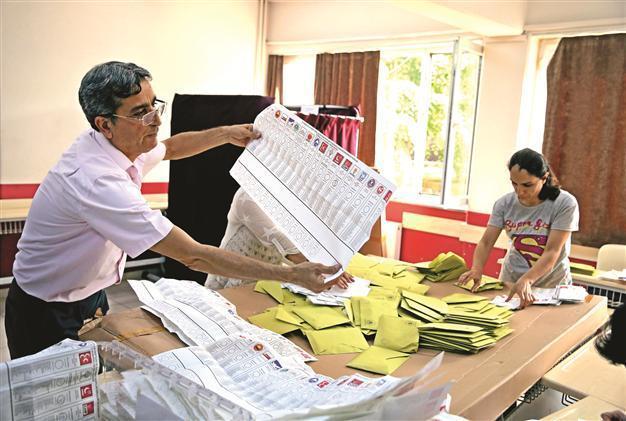Survey: Snap polls won’t change much in Turkey
Ahmet Hakan – ISTANBUL

AP Photo
As the new parliament opens and the new government’s coalition options are debated, the head of the polling company that made the closest voting predictions for the June 7 parliamentary election said there would not be any changes if an early poll was to be held.
Özer Sencar, the head of Metropoll, a company which conducts surveys, said that if snap elections were to be held due to a possible failure in forming a coalition government in the following days over the summer, the electorate would not change the vote it casted at the June 7 election, leaving the results unchanged.
“The public stands very firmly behind the decision it gave on June 7; it does not regret the votes it casted,” said Sencar, adding that the current elections results would not change in the case of an early election.
He said according to a recent survey conducted after the election, the Justice and Development Party (AKP) would receive 41.6 percent, the Republican People’s Party (CHP) 25.1 percent, the Nationalist Movement Party (MHP) 16.2 percent and the Peoples’ Democratic Party (HDP) 12.9 percent if snap polls were to be held.
According to the official results announced on June 18 by the Supreme Election Board (YSK), the AKP received 40.66 percent of the total, the CHP won 25.13 percent, the MHP won 16.45 percent and the HDP won 12.96 percent.
Accordingly, the AKP has 258 seats in the 550-seat parliament and the CHP has 132, while the MHP and the HDP will have 80 seats apiece. The AKP, therefore, failed to secure the majority in the 550-seat parliament required to rule alone.
In its latest polls done before the June 7 elections, Metropoll predicted the results to be 41 percent for the AKP, 27.2 percent for the CHP, 16 percent for the MHP and 11.5 percent for the HDP.
As the 25th term of the Turkish Parliament has started with the newly elected deputies taking their oaths on June 23, President Recep Tayyip Erdoğan is expected to give the role of forming the government to one of the four party leaders, most probably Prime Minister Ahmet Davutoğlu, as the party with the highest votes. The official rounds to form a coalition government will start thereafter.
‘Public doesn’t have one coalition model in mind’
Answering a question on what the public wanted as a coalition, Sencar said the highest possibility was the AKP-MHP coalition as this option received 22.8 percent of the surveyed vote, though this did not mean that the country had a specific coalition model in mind.
“There is no one coalition model that suits the public’s ideas. Therefore, any coalition model, given that it is told to the public truly and convincingly, can get the support of the public,” said Sencar, adding that there was 20 percent support for the CHP-MHP-HDP model and only 8 percent for a AKP-CHP possibility.
What voters are saying is that parties should agree among themselves and form a coalition government, says Sencar.
‘Erdoğanism’ has ended
Describing the last four years of Erdoğan’s policies on the country starting from 2011 as “Erdoğanism,” Sencar said this period had lasted “only four years,” and that it had irremediably come to an end on June 7.
“Whatever happens as of now, it won’t be the same as it was before June 7,” he said.
Evaluating President Erdoğan’s rallies before the election under the title “meeting with the people,” Sencar said the public had not approved of this action: Some 61 percent surveyed said they were negatively affected by these rallies, whilst 25 percent of the AKP voters also voiced this opinion.
Sencar said HDP co-chair Selahattin Demirtaş was the “most successful and bright” politician that came to the political scene in the latest years, who, according to Sencar, brought humor back into politics and was the reason for the HDP passing the 10 percent election threshold. Meanwhile, Davutoğlu chose to be a bad imitation of Erdoğan, according to Sencar.
